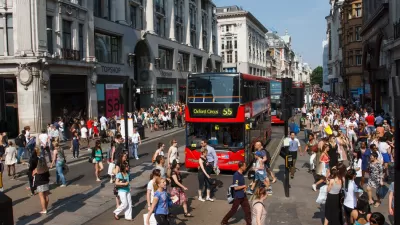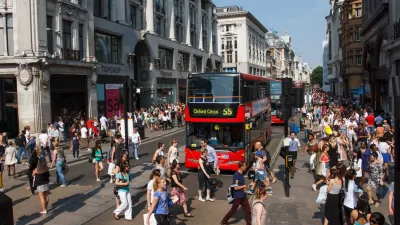Forget the countryside. Urban walking helps people understand their cities while at the same time encouraging urban landscapes where people actually want to walk.

An essay by Jonn Elledge explores the many joys of urban walking and how a better understanding of urban environments is mutually beneficial to cities and the people living in them. Elledge is a fan of the long, meandering walk – what he says is a British pastime and an opportunity to exercise, unplug, and unwind. However, rural areas, with a focus on fresh air and open space, have often been touted as the places for the best walks. Elledge argues instead that cities have much to offer people walking through them:
There’s only so much you can learn from behind the wheel of a car or the window of a train, zooming past things before you even notice them, and anyway, in those vehicles, you need a destination. On foot, though, you can wander: serendipity kicks in, and you find things you never even knew you were looking for.
In addition, walkable cities are just more interesting cities. “A street with heavy footfall is a street that’s likely to attract the bars and cafes and other things that make a city worth living in, in exactly the way a dual carriageway won’t,” says Elledge. As more people move to urban areas around the world, he believes the insight gained through urban walking can ultimately help us solve many of the challenges cities face today and will contend with in the future.
FULL STORY: Urban walking isn’t just good for the soul. It could save humanity

Planetizen Federal Action Tracker
A weekly monitor of how Trump’s orders and actions are impacting planners and planning in America.

Maui's Vacation Rental Debate Turns Ugly
Verbal attacks, misinformation campaigns and fistfights plague a high-stakes debate to convert thousands of vacation rentals into long-term housing.

Restaurant Patios Were a Pandemic Win — Why Were They so Hard to Keep?
Social distancing requirements and changes in travel patterns prompted cities to pilot new uses for street and sidewalk space. Then it got complicated.

In California Battle of Housing vs. Environment, Housing Just Won
A new state law significantly limits the power of CEQA, an environmental review law that served as a powerful tool for blocking new development.

Boulder Eliminates Parking Minimums Citywide
Officials estimate the cost of building a single underground parking space at up to $100,000.

Orange County, Florida Adopts Largest US “Sprawl Repair” Code
The ‘Orange Code’ seeks to rectify decades of sprawl-inducing, car-oriented development.
Urban Design for Planners 1: Software Tools
This six-course series explores essential urban design concepts using open source software and equips planners with the tools they need to participate fully in the urban design process.
Planning for Universal Design
Learn the tools for implementing Universal Design in planning regulations.
Heyer Gruel & Associates PA
JM Goldson LLC
Custer County Colorado
City of Camden Redevelopment Agency
City of Astoria
Transportation Research & Education Center (TREC) at Portland State University
Jefferson Parish Government
Camden Redevelopment Agency
City of Claremont





























